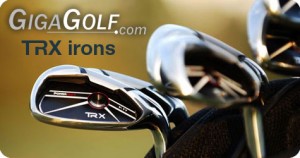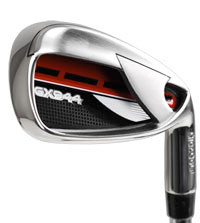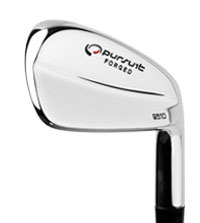 If you been around golf for a while you’ve probably seen other golfers, and maybe even friends, playing golf clubs with names like Power Play, Acer, Pinemeadow, GigaGolf, and Excel. Through research you figured out that these clubs were part of that category of golf clubs called “clones”.
If you been around golf for a while you’ve probably seen other golfers, and maybe even friends, playing golf clubs with names like Power Play, Acer, Pinemeadow, GigaGolf, and Excel. Through research you figured out that these clubs were part of that category of golf clubs called “clones”.
Some golf club clone manufacturers use openly available component heads, shafts and grips to build golf clubs that resemble the name brand clubs.
Other companys have the heads built custom for them (usually in China) and then use openly available shafts and grips. They then assemble the clubs custom to each customer’s specifications. Brands like GigaGolf and Pinemeadow are this type of clone manufacturer.
» Pinemeadow Golf Closeout Specials
First, a little background
Golf club clones gained popularity in much the same way that clone computers did. In the personal computer world when computers first came out there were only a few major manufacturers. They sold good products but they were sold at premium prices.
It didn’t take long for some bright eyed entrepreneurs to realize that they could make computers from much the same parts (the parts were actually manufactured overseas anyway) and put their own names on them. They sold them with names like Compaq and Dell and Gateway, and many others. Over time, customers came to realize that these computers were just as good but cost much less than the name brands. Soon clones were so successful that the name brands went away from the marketplace (good bye IBM).
This has not exactly happened in golf industry yet but the analogy still works. Clone golf clubs offer an inexpensive alternative to the name brand clubs.
But it still begs the question… Are clone golf clubs as good as name brand clubs?
Let’s take a look at where the brand clubs come from and how they are designed and manufactured.
Surprisingly, most of the top name brand golf club manufacturers of today were not in the golf business 30 years ago. Ping, TaylorMade, Callaway and Nike have only become major brands in the last 20 years. Some like Titleist, Ben Hogan, and MacGregor have been around a long time but they’ve certainly lost a lot of their marketshare to the new boys on the block.
 The early manufacturers (pre 1980) designed golf clubs in a very traditional way using standard manufacturing techniques and designs that had been around for years. Their clubs were really built for professionals and better players. There was no concept of building game improvement clubs for the average player. You either learned to hit the clubs the pros played or you didn’t.
The early manufacturers (pre 1980) designed golf clubs in a very traditional way using standard manufacturing techniques and designs that had been around for years. Their clubs were really built for professionals and better players. There was no concept of building game improvement clubs for the average player. You either learned to hit the clubs the pros played or you didn’t.
It wasn’t until Ping developed the concept of perimeter weighted, cavity back golf irons that golf club design began to change. After Ping’s success, all manufacturers were forced to adopt the game improvement features that are common today. Perimeter weighting, low-back center of gravity, thick top lines, and hosel offset are all standard features of today’s game improvement clubs that were innovated by Ping. I guess you could say that all these new game improvement clubs are just clones of Ping. TaylorMade, Callaway and Nike have made their mark by developing great versions of the designs developed by Ping.
As great as they are, today’s new iron designs are really just different ways of moving weight around within the confines of the overall weight of the clubhead (which cannot change). Contrary to what the manufacturers would have us believe, golf club design is science but not rocket science.
What about the materials that the brands use?
All quality brand golf club heads are made from basically three kinds of metal.
- Stainless steel – either 17-4 or 431
- Carbon steel (mostly for forged clubs)
- Beta titanium.
You can also find clubs that use zinc and aluminum/steel composites but these are NOT the materials that any sort of quality brand club uses. Cheap sets for beginners and juniors use these materials.
 What about the manufacturing process?
What about the manufacturing process?
All golf clubs are made from two processes – casting or forging.
Investment casting uses pre-shaped molds into which is poured molten stainless steel. This is the way most of the perimeter weighted, cavity back designs are manufactured (but not necessarily).
The forging process uses massive hammers to pound the carbon steel into the desired shape. Forging is more expensive and offers fewer head shape design possibilities.
So given the available materials, manufacturing processes, and head shape variables, a brand name manufacturer spends their time and money, developing new clubhead variations. They have those variations manufactured for them in China (no one does there own manufacturing these days). They then buy shafts and grips and have all three components assembled.
Once those new variations hit the marketplace, and the golf course, we the people decide if we like them and wether to buy it.
But wait. Something else happens first. The pros. Don’t forget about the pros. The pros get to play them first…sort of.
The pros play “pro versions” of each manufacturers’ clubs. When Tiger Woods plays Nike, Phil Michelson plays Callaway, and Chris DeMarco plays Ping clubs, their clubs have less perimeter weighting, less of a wide sole, less offset, and less low-back weighting then the clubs we should use. They play clubs that have all the forgiveness taken out of them. They don’t need forgiveness like us weekend golfers do.
But even though the pros don’t play the same clubs as the average golfer, their names create credibility for that manufacturer which translates into sales. Those sales translate into popularity and a now everyone wants the new Callaway X22. And maybe they should. They are very nice clubs for the average golfer.
But thanks to that long development process and paying those pros, that X22 iron set costs $899 on the street. Whew! And that’s just for the off-the-rack model. If you want any sort of custom fitting or special shafts, that takes more money and more time.
All this may be worth it if you really want to play the name brand and want name prestige. But what if you don’t?
Send In the Clones
Once the golf club clone manufacturers see that a clubhead design is successful, they then copy the design (within trademark limits) and manufacturer the head using the same steel and the same manufacturing process as the brands (sometimes in the same casting foundries). Because their development costs are much less, they can then sell those clubheads for less then the manufacturers can. The clone retailers then add the same shafts and the same grips that the brands use and market them direct to you -usually over the internet.
So to answer the big question – does this mean that the clone clubs are as good as the name brands?
No, it doesn’t.
It still depends on how good the quality control of the manufacturing process was. Also the online manufacturer that assembles the components must do a good job.
A good judge of the final quality is how well a clone manufacturere stand’s behind their clubs.
- Do they offer a warranty?
- Do they offer good custom fitting options?
- Can you try the clubs to make sure you like them… and still get your money back?
Direct To You…
Most online clone stores also have the advantage of cutting out the middleman retail stores. They sell directly from the manufacturing facilites cutting thousands of dollars in distribution and markups that the normal brand companies must add to the cost of their clubs. They also don’t have to pay endorsees megabucks so that also keeps the cost of the clubs down.
If the clone manufacturer offers all of the above you may be getting 95% of the value of a brand club at 30% of the price. A good deal in anyone’s book.
Particularly if you need custom clubs!
One thing that the online clone retailers excel at is customization. You can often select custom grips, custom shafts, and custom fitting for your height, swing speed and game, all done directly online before the clubs are manufactured. Custom clone clubs can usually ship within days instead of weeks. Even the brands can’t offer this kind of customization.
A good clone online store will let you change the shaft, grip and even the head during a 30 day trial period. What a great way to try a club and see if you like the quality, the feel, and the fitting at no risk. It’s really a great way to buy clubs. In fact, my first reaction when I looked more closely at clones is why don’t they sell them for more money? Their certainly worth more.
So what’s the verdict?
That’s up to your needs. There’s no question that clone clubs are a great value. Particularly if your game does not require absolute, first quality. For beginners and intermediate golfers it’s hard to beat clone clubs.
In fact, if you’re over a 10 handicap or higher I bet brand clubs offer no advantage over clones for your game. My opinion only. But I will say, I played with some Ping clones called Primas for over 20 years. My handicap went from a 20 to a 5 using those clubs. I eventually wore them out and bought a set of TaylorMade RAC OS clubs. Honestly, the TaylorMade’s are not any better than those Primas. They do go farther due to their stronger lofts but I don’t see any major advantage to them.
If, however, you want to eliminate all doubts and get clubs that the some of the best players use, then by all means get brand name clubs. The name brands became that way by delivering quality that has stood the test of time in most cases. Many golfers love their name brand clubs so you can’t argue with that.
The bottom line is…choose whatever gives you the most confidence and helps you enjoy the game the most.
Recommended Clone Manufacturers
If you decide to go with clones, here’s a couple of great clone suppliers to check out.


